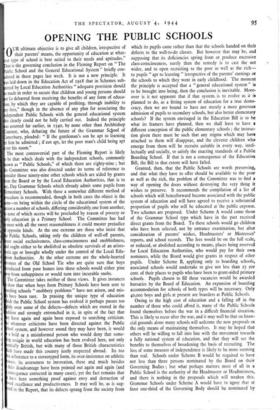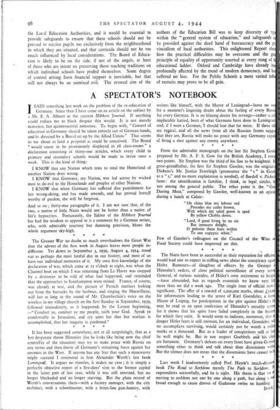OPENING THE PUBLIC SCHOOLS
OUR ultimate objective is to give all children, irrespective of their parents' means, the opportunity of education at *hat- er type of school is best suited to their needs and aptitudes." hat is the governing conclusion in the Fleming Report on " The blic School and the General Educational System " briefly con- dered in these pages last week. It is not a new principle. It as laid down in the Education Act of 1918 that in Schemes sub- itted by Local Education Authorities " adequate provision should made in order to secure that children and young persons should t Le debarred from receiving the benefits of any form of educa- on, by which they are capable of profiting, through inability to ay fees," though in the absence of any plan for associating the dependent Public Schools with the general educational system is clearly could not be fully carried out. Indeed the principle as asserted far earlier, in 1540, by none other than Archbishop ranmer, who, debating the future of the Grammar School of nterbury, pleaded: " If the gentleman's son be apt to learning him be admitted ; if not apt, let the poor man's child being apt ter his room."
The most controversial part of the Fleming Report is likely be that which deals with the independent schools, commonly own as " Public Schools," of which there are eighty-nine ; but e Committee was also directed under its terms of reference to insider those ninety-nine other schools which are aided by grants om the Board or by the Local Education Authorities, that is to y, Day Grammar Schools which-already admit some pupils from lementary Schools. With these a somewhat different method of ocedure is recommended, though in both cases the object is the me—to bring within the circle of the educational system of the non a number of schools, differing considerabkone from another, none of which access will be precluded by reason of poverty or ly education in a Primary School. The Committee has had meet with all the sweet reasonableness it could muster prejudice opposite kinds. At the one extreme are those who insist that e Public Schools, taking only the children of well-off parents, ster social exclusiveness, class-consciousness and snobbishness, d ought either to be abolished as obsolete survivals of an atic age or brought wholly under the control of the Local Edu- tion Authorities. At the other extreme are the whole-hearted votees of the Old School Tie who are quite sure that boys troduced from poor homes into these schools would either pine ay from unhappiness or would turn into incurable snobs.
The Committee takes neither of these views. It gives instances show that when boys from Primary Schools have been sent to rding schools " snobbery problems " have not arisen, and mis- have been rare. In praising the unique type of education ch the Public School system has evolved it perhaps passes too tly over some of the defects—defects which are rooted in the dition and strongly entrenched in it, in spite of the fact that v have again and again been exposed to searching criticism. whatever criticisms have been directed against the Public hool system, iind however sound they may have been, it would a bold or a misinformed person who would deny that some- og uniqtie in world education has been evolved here, not only ntially British, but with many of those British characteristics ch have made this country justly respected abroad. Its too se adherence to a stereotyped form, its over-insistence on athletic mess, its averseness to innovation, these and much besides their disadvantage have been pointed out again and again (and consequence corrected in many cases), yet the fact remains that have here something proof against envy and detraction of ved excellence and productiveness. It may well be, as is sug- ted in the Report, that its defects sprang from the society from which its pupils came rather than that the schools handed on their defects to the well-to-do classes. But however that may be, and supposing that its deficiencies spring from or produce excessive class-consciousness, surely then the remedy is to cast the net wider, and to open recruiting to the poor as well as the rich— to pupils " apt to learning " irrespective of the parents' earnings or the schools to which they went in early childhood. The moment the principle is accepted that a " general educational system " is to be brought into being, then the conclusion is inevitable. More- over is it not apparent that if that system. is to evolve as it is planned to do, as a fitting system of education for a true demo- cracy, then we are bound to have not merely a more generous admission of pupils to secondary schools, but also better elementary schools? If the system envisaged in the Education Bill is to be what its framers have planned, then we shall have to have a different conception of the public elementary schools ; the instruc- tion given there must be such that any stigma which may have attached to them will disappear, and the cleverer children who emerge from them will be recruits suitable in every way, intel- lectually and socially, to satisfy the exacting standards of a Public Boarding School. If that is not a consequence of the Education Bill, the Bill to that extent will have failed.
Granted, then, that the Public Schools are worth preserving, and that what they have to offer should be available to the poor as well as the rich, the problem of the Committee was to find a way of opening the doors without destroying the very thing it wishes to preserve. It recommends the compilation of a list of schools which will henceforward become associated with the public system of education and will have agreed to receive a substantial proportion of pupils who will be educated at the public expense.
Two schemes are proposed. Under Scheme A would come those of the Grammar School type which have in the past received direct grants from the Board. To these schools would go children who have been selected, not by entrance examination, but after consideration of parents' wishes, Headmasters' or Mistresses' reports, and school records. The fees would be on the full scale, or reduced, or abolished according to means, places being reserved for Local Education Authorities, who would pay for their own nominees, while the Board would give grants in respect of other pupils. Under Scheme B, applying only to boarding schools, associated schools would undertake to give not less than 25 per cent. of their places to pupils who have been to grant-aided primary schools. Pupils chosen to fill these vacancies would be awarded bursaries by the Board of Education. An expansion of boarding accommodation for schools of both types will be necessary. Only 4o,000 boys and girls at present are boarders at Public Schools.
Owing to the high cost of education and a falling off in the number of those who could afford it, many of the Public Schools found themselves before the war in a difficult financial situation. This is likely to recur after the war, and it may well be that on finan- cial grounds alone many schools will welcome the new proposals as the only means of maintaining themselves. It may be hoped that others will be willing to fall into line with the movement towards a fully national system of education, and that they will see the benefits to themselves of broadening the basis of recruiting. The loss of some measure of independence is likely to be more seeming than real. Schools under Scheme B would be required to have not less than three persons nominated by the Board on their Governing Bodies ; but what perhaps matters most of all in a Public School is the authority of the Headmaster or Headmistress, and there is nothing in the proposals which will weaken this. Grammar Schools under Scheme A would have to agree that at least one-third of the Governing Body should be nominated by the Local Education Authorities, and it would be essential to provide safeguards to ensure that these schools should not be pressed to receive pupils too exclusively from the neighbourhood in which they are situated, and that curricula should not be too much influenced by local considerations. The Board of Educa- tion is likely to be on the side, if not of the angels, at least of those who are intent on preserving those teaching traditions on which individual schools have prided themselves. Some degree of control arising from financial support is inevitable, but that will not always be an unmixed evil. The avowed aim of the authors of the Education Bill was to keep diversity of within the " general system of education," and safeguards c be provided against the dead hand of bureaucracy and the pr vincialism of local authorities. This enlightened Report sh hbw the practical difficulties may be overcome and the gr principle of equality of opportunity asserted at every rung of educational ladder. Oxford and Cambridge have already profoundly affected by the trend of modem democracy, and ha suffered no loss. For the Public Schools a more varied intl of recruits may prove to be all gain.



























 Previous page
Previous page